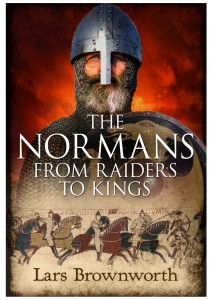
James asks (with exquisite timing) if I’m going to write a book about the Normans. Not only is the answer yes, but for the next week (till Thursday the 22 of May) it’s running under a promotional price of $3.99 from Amazon and Barnes & Noble.
Writing a book is both about telling a story and finding an ‘angle’ – and one of the most interesting things for me was in telling a familiar story (the Byzantine revival under the Comneni Dynasty, the First Crusade, etc) from the Norman perspective. As a fan of Byzantium, characters like Guiscard, Bohemond, and William I were always the bad guys, dangerous thugs that successive emperors had to dance around to avoid being conquered. But the Normans of the south had to do their fair share of dancing too, and for one brief moment they not only mastered it, but outshone Constantinople itself. Palermo during its golden age had a splendor all its own.
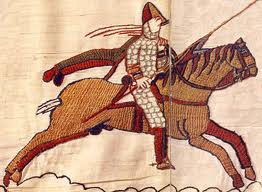 If the Normans of the 11th century are to be believed, Tancred de Hauteville was a boar-slaying, righteously glorious knight who sired 12 sons and at least two daughters. Most of those children headed south to make their fortunes in Italy, and their story is covered in the Norman Centuries podcast. But what about those who remained in Normandy? Listener Shane asks what we know about the 4 children who stayed behind.
If the Normans of the 11th century are to be believed, Tancred de Hauteville was a boar-slaying, righteously glorious knight who sired 12 sons and at least two daughters. Most of those children headed south to make their fortunes in Italy, and their story is covered in the Norman Centuries podcast. But what about those who remained in Normandy? Listener Shane asks what we know about the 4 children who stayed behind.
Our three main primary sources for all things Hauteville are Geoffrey Malaterra’s The Deeds of Count Roger, William of Apulia’s The Deeds of Robert Guiscard, and Amatus of Montecassino’s History of the Normans. All were composed between 1080 and 1099, and deal mainly with the Normans in Italy, which means that we know next to nothing about those who opted to stay at home. (Despite later attempts to make the patriarch into a figure worthy of his son’s accomplishments, no one in Normandy at the time cared enough about an impoverished knight to record anything about him). The only one who mentions the remaining sons at all is Malaterra, who simply lists the names Aubrey, Hubert, and Tancred jr, and then moves on. Two daughters (Beatrix and Fressenda) are mentioned because of the husbands they married (Fresseda especially played an important part in early Norman politicking). The only exception to this informational blackout, concerns the oldest brother Serlo. Malaterra mentions that he ran afoul of the Duke (Robert the Devil- William the Conqueror’s father) for murdering a man. In exile he occupied himself with the family business of piracy, raiding Normandy repeatedly. After a suitably heroic display of valor against a local French champion (single combat naturally), Serlo wins over Duke Robert, who realizes the error of exiling such a knight. Serlo pledges his loyalty and presumably settles down into a wealthy, well-respected life- the Norman equivalent of happily ever after.
Due to the paucity of source material, there really hasn’t been any historical writing on these sons of Tancred who stayed in Normandy. (For that matter there hasn’t been much about any except Guiscard and Count Roger). But if historical fiction is more to your taste, there is at least one option. The Words of Bernfrieda: A Chronicle of Hauteville by Gabriella Brooke tells the story of a handmaiden of Tancred’s daughter Fressenda and the clash between the brothers Guiscard and Roger. Since women are almost completely ignored in our primary sources, I think it’s fitting that in this case the two most famous siblings are footnotes in their sister’s story.
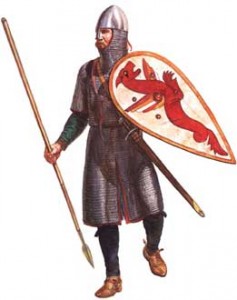 Monty asks if Great Britain would have become a great nation without the martial input of the Normans.
Monty asks if Great Britain would have become a great nation without the martial input of the Normans.
Of course we can’t know for sure what would have happened if the Normans hadn’t crossed the Channel, but to answer the question briefly I think the answer is ‘no’. Without the Normans I doubt there would even be a Great Britain much less a British Empire. The union of Scotland and England into a new entity called Great Britain came about with the Act of Union in 1707 (Ireland wasn’t officially added until 1801), but despite the late date it was the final act in a play that had begun with William the Conqueror.
The Anglo-Saxons were always more defensively minded than the Normans. Harold and his predecessors had contacts with the neighboring kingdoms- Godwin’s family involved themselves with both Macbeth in Scotland and Diarmait mac Maíl na mBó in Ireland- but never on a large scale. Where they did exert themselves (the Welsh border for example) they settled for a sort of ‘over-king’ recognition. Scotland was more organized and therefore a more difficult conquest, and if one of Harold’s successors had the inclination and ability to pull off an invasion, they most likely would have tried to impose the same kind of recognition. Ireland on the other hand, was probably too much of a stretch even for the most ambitious Anglo-Saxon king. The Irish Sea was notoriously difficult and the English didn’t yet see the value of a fleet. The real obstacle to an Old English empire was the Anglo-Saxon style of fighting. They didn’t have professional armies, and shield walls (as the name implies) are better for fending off an attack than carrying out one.
The Normans by contrast, had both the organization and more importantly the desire to invade. They cut a swath through medieval Europe dominating the stage for over a century and rarely losing a battle. Their heavy cavalry raids were nearly unstoppable- there is no better example than at Cerami in Sicily where 500 Norman knights smashed an army 70 times their size. It was this martial spirit that carried Norman arms into Ireland, Scotland, and Wales, and triumphed at Crécy and Poitiers. The Act of Union- and the British Empire- was the end result of that drive.
One final postscript: I think the Anglo-Saxons generally get short-changed by historians. The heavy cavalry charge that saw the Normans to victory in nearly every battle dramatically failed in two cases. The first was at Hastings- the shield wall/axe-wielding huscarls more than held their own against repeated charges. The English lost because their discipline let them down- they abandoned the higher ground in scattered groups to chase fleeing knights and were butchered out in the open. The second case was exactly fifteen years later near the Albanian city of Dürres. The Varangian Guard- composed largely of Anglo-Saxon refugees met the Norman army of Robert Guiscard. Once again the Norman charge failed and the Anglo-Saxon huscarls inflicted horrendous casualties on the attacking cavalry. Unfortunately for the English, large segments of the imperial army chose that moment to desert and the Varangians were left exposed and surrounded. The result was a second defeat, which effectively obscured what the English had accomplished. They might never have become a great power with a defensive mindset, but the fighting abilities of the Anglo-Saxons stopped the foremost military machine of the 11th century in its tracks. Twice.
 Monty asks how English would be different if the Normans had lost at Hastings.
Monty asks how English would be different if the Normans had lost at Hastings.
If you want a good idea of how different English was before the Normans, pick up a copy of Beowulf and try to read the original text. It’s a Germanic language that bears little apparent resemblance to the words you’re reading here. The temptation then is to say that it was the Norman Conquest which gave English its recognizable form. But here is where it gets interesting. Languages are living things and Anglo-Saxon was constantly evolving during the 7 centuries it was in use. There were Celtic influences, Norse influences, and even a bit of Latin from the clerics who converted the population. The Normans added a healthy mix of French but exactly how much is a matter of some debate. Depending on the expert you consult, you’ll hear that the percentage of English derived from Latin or French is 15%, 29%, or 50%.
I asked a linguist how there could be such a huge discrepancy and she gave me an intriguing answer. In the first place nobody knows exactly how many English words there are. For example, are ‘run’, ‘running’, and ‘ran’ three different words or should they just count as one? Secondly, it makes a big difference if you’re counting ‘textbook’ words or words that are commonly spoken. It turns out that the vast majority of our common words come from Old English while the ‘textbook’ words are more likely to be derived from Latin or French. So if you’re feeling blue and you describe yourself as ‘sad’, you’re using an Old English word, but if you say ‘I feel Lugubrious’ you’re using Latin.
So what effect did the Norman Conquest have on the English language? Obviously it has had an impact over the last millennium- it would have been impossible not to. But I think it had less effect than most of us assume, and as far as our spoken tongue, less still. Those old Norman blue bloods are still perched at the upper crust of the language, but where most of us live in our day-to-day lives, we are surrounded mostly by Anglo-Saxons. To paraphrase the great historian David Howarth, ‘in the end the English really did conquer their conquerors’.
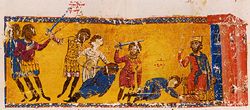 Listener Shane asks if Romanus Sclerus- the man who brought down George Maniakes- was related to the Bardas Sclerus who tried to seize the throne from Basil II.
Listener Shane asks if Romanus Sclerus- the man who brought down George Maniakes- was related to the Bardas Sclerus who tried to seize the throne from Basil II.
Romanus was indeed the great-grandson of the general Bardas. The Sclerus family was an old aristocratic one that claimed dynastic ties to Basil I, and was constantly trying to inch closer to the throne. The real ambitious one in the family- and arguably the most successful- was Romanus’ sister Maria. She fell in love with Constantine Monomachus, an up and coming nobleman who was on a very short list to marry the reigning empress Zoë. When Constantine was outmaneuvered and banished to the island of Lesbos, Maria followed, trusting that fate would offer them a second chance at the throne. Seven years later the political winds had changed and Zoë summoned Constantine to the capital to become her husband. At their very first meeting together, Constantine brazenly demanded that the empress should bring Maria to Constantinople- and give her suitable titles as well. Zoë, now 64 and interested only in the trappings of power, philosophically agreed. Maria was brought to the capital with great pomp and installed into the imperial palace next to Constantine. Now, if Zoë wanted to see her husband, she had to go through the awkward process of clearing it with Maria first.
It was at this point- with nary an objection from the compliant empress- that the two lovers realized they could get away with virtually anything. Why should Maria be content with the designation of ‘official mistress’? She was after all a member of an old and dignified family. Constantine drew up a document officially giving her the title ‘Augusta’, Zoë obligingly signed it, and the entire Senate was called in to ratify it. There were now three empresses (Zoë’s sister was also an empress) and a total of four heads of state. Oddly enough, Zoë doesn’t appear to have minded the bizarre arrangement. As long as she had access to the treasury Constantine could do as he liked.
The imperial ménage a trios may have been ok with the court, but it nearly got Constantine lynched. The population of Constantinople was scandalized and tried to rush the emperor as he was mounting his horse at the imperial gates. Screaming that they didn’t want Maria for empress- only a pure Macedonian- they overpowered the guards, and would have killed Constantine if not for the sudden appearance of Zoë gesticulating wildly from a balcony. From then on Constantine only appeared in public with Zoë safely at his side- and Maria following a distance behind. He probably still intended to somehow make her the senior empress, and given enough time perhaps he could have, but she died suddenly in 1045. A decade later Constantine expired as well, and in a final posthumous slap at Zoë, chose to have himself interred next to his beloved Maria. The old rebel Bardas Sclerus would have been pleased.
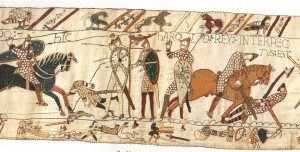
Listener William asks why the Bayeux Tapestry is considered an important or credible source.
There are three main ‘eyewitness’ accounts of the Battle of Hastings- a short poem called Carmen de Hastingae Proelio (made as early as 1067), the Anglo Saxon Chronicle (9 manuscripts of year-by-year events kept at various monasteries across England), and the Bayeux Tapestry. The Tapestry (which isn’t really a tapestry at all), was most likely finished by 1077, and is a goldmine of inadvertent information. Commissioned by William’s half-brother Bishop Odo, it was intended to justify the Norman invasion while casting its two protagonists in a glowing, heroic light. Unfortunately this bias at times compromises the larger credibility of the work. For example, Harold’s coronation is shown being performed by Bishop Stigand, a man whose well-earned reputation for corruption had put a cloud over all of his dealings for years. As an earl, Harold had refused to let Stigand consecrate any of his religious foundations, and it’s unlikely that he would have let the tainted clergyman anywhere near the royal ceremony. His presence in the Tapestry is probably a none-too subtle Norman attempt to further discredit Harold. There are other bias’ in the work as well. Bishop Odo employed English artisans to execute the Tapestry, and there have been several books written about their subversive depictions of the Norman triumph.
But even with these reservations, the Tapestry remains a vital, eyewitness source for contemporary life and warfare in the 11th century. In it we can glimpse the weapons, armor, styles of clothing, and even the pursuits of leisure in the vanished Norman and Anglo-Saxon worlds.
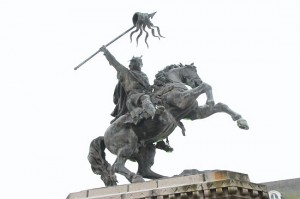 Listener David points out, ‘you called William’s conquest of England the last successful invasion of England by a foreign army. Is that really the case? Didn’t Frenchman Henry Plantagenet invade with local support and force King Stephen to name him as his successor? Didn’t Welsh aristocrat Henry Tudor take the throne as Henry VIII with the help of Lancastrian allies? And wasn’t the “Glorious Revolution” actually a successful Dutch invasion of England? Isn’t it a double standard to categorize any successful invasion that has local support, as a civil war or a revolution instead of an invasion?’
Listener David points out, ‘you called William’s conquest of England the last successful invasion of England by a foreign army. Is that really the case? Didn’t Frenchman Henry Plantagenet invade with local support and force King Stephen to name him as his successor? Didn’t Welsh aristocrat Henry Tudor take the throne as Henry VIII with the help of Lancastrian allies? And wasn’t the “Glorious Revolution” actually a successful Dutch invasion of England? Isn’t it a double standard to categorize any successful invasion that has local support, as a civil war or a revolution instead of an invasion?’
David makes an excellent point here. All of these examples are invasions and can quite rightly be called as such. In each case non-English men seized power in England supplanting the previous dynasty. So calling William the last successful invader is not technically correct. I think there is a valid defense to be made, however, for distinguishing between these examples and what happened at Hastings in 1066. It’s a double standard, but the term ‘invasion’ is usually reserved for a massive social upheaval where an ethnically or culturally different force displaces the native regime. More than just a small change at the top (one related aristocrat for another) it’s a traumatic event that results in widespread effects at all social levels. In that respect, William was the last of a series of invaders: Roman, Anglo-Saxon, Viking, and finally Norman. No social upheaval quite so far-reaching has come at the hands of a foreign invader since.
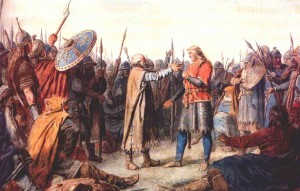 Listener Pete asks if Tostig Godwinson should be considered a heroic figure. It’s somewhat hard to get a fair picture of Tostig because unlike the other principle figures of 1066, he lacks a chronicle written from his perspective. He ended up on the wrong side in every respect- to the English he was a traitor, to the Normans he was irrelevant, and to the Norse he was merely a means to an end- a despicable figure who had sold out his own brother. But Tostig was clearly a man of many abilities- a fact which is frequently ignored. As the third son of Earl Godwin, he was always a bit overshadowed by his older brother Harold, but he obviously had the family knack for politics. His father secured him an influential marriage with the daughter of the Count of Flanders, and he quickly ingratiated himself at the English court. Thanks to his considerable charm he became the favorite brother of Queen Edith and so impressed King Edward that he was appointed Earl of Northumbria at the relatively young age of 30. This was a difficult assignment for many reasons. Northumbria was a mess, a wild place controlled by outlaws where the earl’s authority seldom went further than the outer wall of his household. The population was a mix of Danish and English who actively resisted outside control and did their best to continue the chaos.
Listener Pete asks if Tostig Godwinson should be considered a heroic figure. It’s somewhat hard to get a fair picture of Tostig because unlike the other principle figures of 1066, he lacks a chronicle written from his perspective. He ended up on the wrong side in every respect- to the English he was a traitor, to the Normans he was irrelevant, and to the Norse he was merely a means to an end- a despicable figure who had sold out his own brother. But Tostig was clearly a man of many abilities- a fact which is frequently ignored. As the third son of Earl Godwin, he was always a bit overshadowed by his older brother Harold, but he obviously had the family knack for politics. His father secured him an influential marriage with the daughter of the Count of Flanders, and he quickly ingratiated himself at the English court. Thanks to his considerable charm he became the favorite brother of Queen Edith and so impressed King Edward that he was appointed Earl of Northumbria at the relatively young age of 30. This was a difficult assignment for many reasons. Northumbria was a mess, a wild place controlled by outlaws where the earl’s authority seldom went further than the outer wall of his household. The population was a mix of Danish and English who actively resisted outside control and did their best to continue the chaos.
Tostig- who was half Danish himself- attacked the problem vigorously and within five years had cleaned up the earldom, arresting the cutthroats and firmly imposing his control. But just as he appeared ready to eclipse his brother everything started to go wrong. His mixed blood should have endeared him to his subjects, but as a southerner he was deeply resented and his habit of using Danish mercenaries as personal guards further alienated him. His firm rule, at first so necessary to enforce order only got harsher as his hired thugs extorted ever-higher taxes. Even worse, he began to show signs of irrational behavior. Any questioning of his authority met with excessive brutality. Two of his most important thegns that he suspected of insubordination were lured to a meeting and executed, and a third was assassinated. This was a wild violation of English law- one of an earl’s responsibilities was to protect his thegns not murder them. The resulting uproar led to Tostig’s banishment, a fate from which even the king couldn’t save him.
Tostig could have faced his exile stoically. He had family in Flanders and could have lived out his life in wealth and comfort. Instead he publicly accused Harold of fomenting the rebellion in his earldom, and left swearing revenge. The result was the death of his allies, himself, and eventually the overthrow of the English kingdom along with what was left of his family. However talented he was to start, Tostig ended as a rather tragic and pathetic figure, wandering around northern Europe begging for help, turned down by everyone he met except the bored Hardrada.
There was at least some redemption for his family. His son Skuli Tostisson Kongsfostre fled to Norway, and his offspring insinuated themselves into the Danish royal family. The current monarch Margrethe II is therefore a distant descendant of Tostig Godwinson.
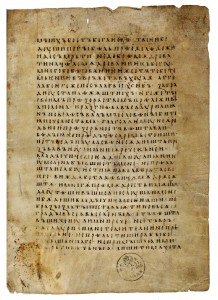 Listener Shane asked if the Normans left behind written works other than histories. The answer is an emphatic yes. They were prolific writers and fortunately we have much of what they produced, especially the Anglo-Norman material. In addition to poems, proverbs, bestiaries, Psalters, commentaries on the Bible, sermons, handbooks, instruction manuals, and hagiographies, we have lyric poetry, satire (mostly poking fun at the clergy or Frenchmen who criticized the English), and Drama like the 12th century mystery “Adam” . Adventure Romances were especially popular (“Ipomedon, Protesilaus, Amadas et Idoine”), but the most famous example of Norman literature is the ‘Song of Roland’- the earliest copy of which is Norman- and which may have been sung by William’s troops at the Battle of Hastings.
Listener Shane asked if the Normans left behind written works other than histories. The answer is an emphatic yes. They were prolific writers and fortunately we have much of what they produced, especially the Anglo-Norman material. In addition to poems, proverbs, bestiaries, Psalters, commentaries on the Bible, sermons, handbooks, instruction manuals, and hagiographies, we have lyric poetry, satire (mostly poking fun at the clergy or Frenchmen who criticized the English), and Drama like the 12th century mystery “Adam” . Adventure Romances were especially popular (“Ipomedon, Protesilaus, Amadas et Idoine”), but the most famous example of Norman literature is the ‘Song of Roland’- the earliest copy of which is Norman- and which may have been sung by William’s troops at the Battle of Hastings.

Listener Shane asked if William the Conqueror and Harald Hardrada had an agreement to attack England jointly. This could after all explain certain curious behaviors by both William and Harald. The Duke delayed his departure to England claiming a lack of favorable winds- was he instead waiting for Hardrada’s attack to draw away King Harold’s forces? Along the same vein, did the Norse invader lower his defenses after Stamford Bridge because he was expecting Harold to be tied up at Hastings? The Normans and Vikings had deep ties and a shared cultural background and it isn’t beyond the realm of possibility that they would act together.
It’s an intriguing idea, but ultimately, I think unlikely. While the close timing of the invasions was certainly mutually beneficial and Hardrada almost certainly knew of William’s plans (he hardly bothered to keep them secret), neither man’s personality was given to sharing. William genuinely believed that he had the best right to the entire kingdom, and while his delay in crossing the Channel proved fortuitous it would be giving him too much credit to say that it was a calculated strategy. Every day that passed with his army still in Normandy cost him in money, food and reputation, and he was as anxious as Harold to resolve the situation as quickly as possible. The more opportunistic Hardrada may indeed have taken advantage of William’s threat, but he was no more likely to share authority than his Norman opponent. He had just finished a fifteen-year war with the legitimate king of Sweden, fought for no other reason than a blatant power grab. This was a man who clearly didn’t tolerate rivals.
If indeed there was an agreement- something like the partition of England that Cnut and Edmund Ironside had concluded a generation earlier- it’s interesting to speculate what would have happened. It would clearly have been a partnership headed for disaster, as neither man would have trusted the other an inch. Only a matter of time and they would be at each other’s throats.









